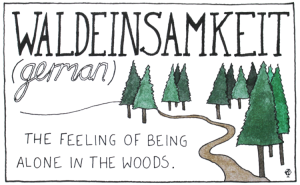 Interesting story on NPR today on words that are difficult to translate into English because they express concepts for which we do not have an equivalent single word. The list comes from a request at the Web site Maptia for readers to submit such examples. The full list is presented nicely at 11 Untranslatable Words From Other Cultures. The first example, from German, Waldeinsamkeit, meaning being alone in the woods is one familiar to me, as it was created by Romantic writer Ludwig Tieck in his story Der blonde Eckbert (1797). German is likely to be one of the languages with the most such words as it’s characteristic of the langauge for speakers to create new compound nouns, which can be amazingly long. One of the longest was in the news this summer, as it was officially “retired”, due to the fact that the law which referenced it was removed by the EU: Rindfleischetikettierungsuberwachungsaufgabenubertragungsgesetz (law delegating beef label monitoring).
Interesting story on NPR today on words that are difficult to translate into English because they express concepts for which we do not have an equivalent single word. The list comes from a request at the Web site Maptia for readers to submit such examples. The full list is presented nicely at 11 Untranslatable Words From Other Cultures. The first example, from German, Waldeinsamkeit, meaning being alone in the woods is one familiar to me, as it was created by Romantic writer Ludwig Tieck in his story Der blonde Eckbert (1797). German is likely to be one of the languages with the most such words as it’s characteristic of the langauge for speakers to create new compound nouns, which can be amazingly long. One of the longest was in the news this summer, as it was officially “retired”, due to the fact that the law which referenced it was removed by the EU: Rindfleischetikettierungsuberwachungsaufgabenubertragungsgesetz (law delegating beef label monitoring).
Other nice words in the list:
- Culaccino: The mark left on a table by a cold glass (Italian)
- Iktsuarpok: The feeling of anticipation that leads you to go outside and check if anyone is coming (Inuit)
- Pana PoʻO: The act of scratching your head to try to remember something (Hawaiian)
- Dépaysement:: The feeling that comes from not being in one’s home country (French)
- Sobremesa: The time spent after lunch or dinner, talking to the people you shared the meal with (Spanish)
- Pochemuchka: Someone who asks a lot of questions (Russian)